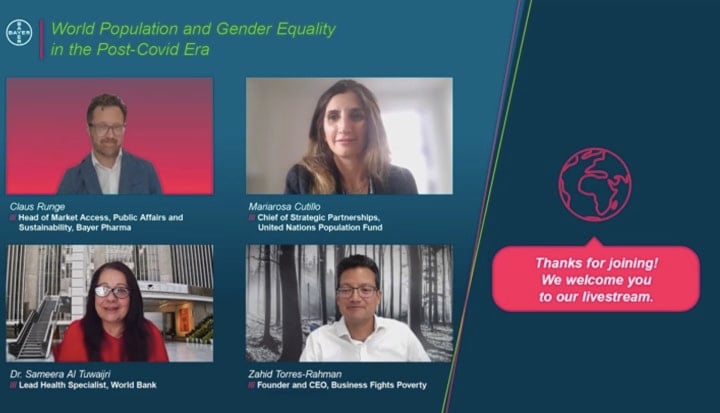The pandemic has caused international upheaval in terms of development aid and gender equality. At a time when low- and middle-income countries (LMICs) need more support than ever before, it has been even more challenging to get the needed funding and assistance. Girls and women in LMICs have been the most impacted, facing challenges ranging from increased violence to lack of family planning options. This, in turn, affects the world population and the future of our planet.
On July 21st, in line with World Population Day, this topic was discussed at an international LinkedIn Event with key experts, moderated by Zahid Torres-Rahman, the Founder and CEO of Business Fights Poverty. It included Mariarosa Cutillo, Chief of Strategic Partnerships, United Nations Population Fund, Dr. Claus Runge, Head of Market Access, Public Affairs and Sustainability, Bayer Pharmaceuticals, and Dr. Sameera Al Tuwaijri, Lead Health Specialist, World Bank.
The panelist agreed that the world was completely unprepared for the Covid-19 pandemic. Dr. Al Tuwaijri expressed her concern: ‘’The pandemic exposed some of the things we’ve already been struggling with and has magnified them. The extent to which countries have been ill-prepared is shocking. And when resources are strained and institutional capacities are limited, we can see across the board that girls and women are impacted much more than anyone else.’’ Mariarosa Cutillo explained that when we look inward, it becomes clear that we don’t yet have a clear image of the future:
‘’One of the main lessons we are learning is that we need to have an integrated view to girls’ and women’s rights, and that the international community needs to keep up to the commitments to ensure access to basic rights like the right to bodily autonomy. If women and girls cannot make choices, we can’t achieve the sustainable development goals.”
The pandemic has put healthcare systems under extreme stress, which has highlighted major contrasts when it comes to gender equality. Many countries don’t see family planning services as essential services, although these are especially important to women.
‘’Dr. Claus Runge emphasized that the pandemic has worsened the gap when it comes to women having contraceptive options. In the pandemic we have learned that we have to do everything we can to meet the needs of these women. We all need to stick to our commitments, now more than ever, and this only works in partnerships. We need to learn the lessons from the pandemic, have systems-based approaches, across borders, at speed.’’
Over 200 million women face unwanted pregnancies in LMICs, and this number continues to grow due to lack of services and support. The solutions? The panelists explained that we need to repeatedly ask policy makers to anchor family planning services in their healthcare systems. This creates new opportunities for women, allowing them to have a choice. Additionally, the panelists agreed that we have all learned a very hard lesson on pandemic preparedness and how this needs to be part and parcel of national health plans. Dr. Al Tuwaijri emphasized: ‘’When you apply the magnifying lens we have learned that poverty, gender and social-cultural indicators have a major impact.’’ Mariarosa Cutillo continued that ‘’the core of our engagement is to work with public and private partners to create ecosystems to put policies into action. We need to rethink, look at the footprint in the communities and support women and girls from the grassroots.’’ There is also a consensus that youth need to be hardwired into future activities, specifically when it comes to messaging and communications. Dr. Al Tuwaijri explained: ‘’the youth are striving to be part of the solution rather than part of the problem. We need to invest in the influencers who can guide this age group and inspire them. We need to identify some the emerging young leaders and have them be the agents of change for this age-group.’’ Finally, Dr. Claus Runge underlined the importance of partnerships and how the specialties of each organization can have a real impact in LMICS: ‘’Every representative needs to know what he or she can bring to the table. You also need to be humble in learning how the ecosystem works and understand how the different partners do business. You shouldn’t come with a pre-defined approach.’’
One thing is clear: now is not the time to cut funding for family planning. This will have major future repercussions. Investing in family planning is also valuable from an economic perspective since every dollar spent on family-planning programs yields a whopping $120 in benefits. The international community needs to continue to put these pressing issues front-and-center and carry on with the discussion of how to empower women. According to the experts, this also means leveraging the current eco-systems and being clear about roles. After all, what is linked to roles are expectations. As Dr. Claus Runge highlighted: ‘’There are just a little more than 100 months left until the 2030 Sustainable Development Goals need to be fulfilled. This means we have to focus, month by month. It’s all hands on deck. But I am optimistic we can do it together.’’
Click here to watch the full event
To learn more, other links of interest:
Foreign aid: Gates and others to partially cover UK aid cuts
FP2020_ROI_OnePager_FINAL.pdf (familyplanning2020.org)
International Conference on Population and Development | UNFPA – United Nations Population Fund










